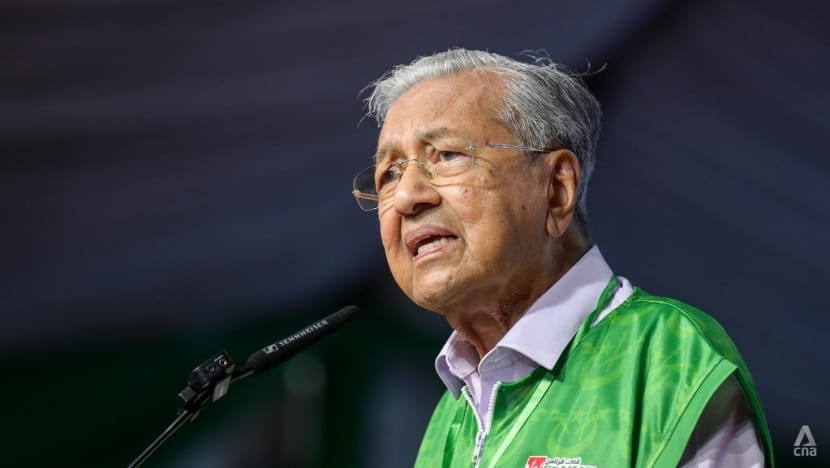Commentary: Malaysia state elections - Perikatan Nasional’s Muhyiddin needs a win
The Aug 12 state elections are seen as a referendum on Prime Minister Anwar Ibrahim, but they pose the same political risk for Perikatan Nasional coalition leader Muhyiddin Yassin, says James Chin, Asian studies professor at the University of Tasmania.
.png?itok=x0tzHW4W)
HOBART, Australia: Six of Malaysia’s 13 states - Kedah, Penang, Kelantan, Terengganu, Selangor and Negeri Sembilan - will go to the polls on Aug 12, the first major election held since the 15th General Election (GE15) last November.
Almost everyone sees the state elections as an indirect referendum on Prime Minister Anwar Ibrahim and his unity government. The stakes could not be higher.
Mr Anwar’s administration - consisting of his Pakatan Harapan (PH) coalition, arch-rival Barisan Nasional (BN), as well as Gabungan Parti Sarawak (GPS) and Gabungan Rakyat Sabah (GRS) - only came together in a tenuous alliance after GE15.
What is less frequently discussed is the fact that the state elections pose the same political risk for Muhyiddin Yassin, the head of the opposition Perikatan Nasional (PN) coalition.
Mr Muhyiddin, also referred to by supporters as Abah (a deferential term for “father” in Malay), came extremely close to forming the government last year. He has been in Malaysian politics for decades and was prime minister for 17 months until his resignation in August 2021.
With Mr Muhyiddin's PN in charge of three of the contested states (Kedah, Kelantan and Terengganu) and the remaining three under Mr Anwar's coalition, Mr Muhyiddin's political career might be in jeopardy if he doesn’t win big next month.
PROBLEMS OF CORRUPTION CHARGES AND DEFAMATION LAWSUITS
Mr Muhyiddin’s political problems are piling up, with legal issues on several fronts.
In March, he was charged with four counts of abuse of power involving RM232.5 million (US$51.1 million) over projects awarded under his government’s COVID-19 stimulus programme. He was also charged with three counts of money laundering involving RM200 million.
His public defence was that the money was a political donation to Parti Pribumi Bersatu Malaysia (Bersatu), the PN component party that Mr Muhyiddin leads, and that he did not benefit personally from it.
Bersatu bank accounts were frozen by the Malaysian Anti-Corruption Commission (MACC) as part of the agency’s investigation. This means Bersatu cannot use these accounts for the state elections.
In the same month, former minister and PH coalition MP Lim Guan Eng filed a defamation lawsuit against Mr Muhyiddin over allegations involving the cancellation of non-profit organisation Al-Bukhary Foundation’s tax exemption status. The trial will take place next year.
Both Mr Anwar and Mr Muhyiddin are currently threatening each other with lawsuits over the Federal Land Development Authority (FELDA) resettlement programme. Both men are claiming credit for waiving billions in debt by FELDA settlers - the rural poor, a key vote bank.
Any slip-up could be costly. In Kuala Lumpur circles, it is well known that Bersatu secretary-general Hamzah Zainudin is considering taking over as party leader should Mr Muhyiddin commit a serious political error.
Mr Hamzah enjoys the support of many rank-and-file members in Parti Islam Se-Malaysia (PAS), PN's most significant component party with the largest number of seats in parliament. Because of his significant contributions to PN’s electoral success in GE15, many in PN are said to believe that he will eventually succeed Mr Muhyiddin.
MUHYIDDIN YASSIN’S WINNING HANDS
Never underestimate Mr Muhyiddin's chances of surviving his legal challenges and possibly returning as prime minister, though.
The big advantage Mr Muhyiddin has over all other PN politicians is simply having expertise and staying power at the top of the political food chain. Having served as Johor chief minister for a decade and as a federal minister for more than two decades, in addition to the short stint as prime minister, he knows everyone who matters in Malaysian politics.
There is no other person in Bersatu or PN who is more capable of putting together a coalition to take over the federal government if Mr Anwar falls.
This is especially important when PN would need to negotiate with political players in Sabah and Sarawak, where almost all the top political leaders know Mr Muhyiddin personally. There is also talk that only Mr Muhyiddin can entice BN component parties, especially the United Malays National Organisation (UMNO), to cross over if the political environment is favourable.
Even former prime minister Dr Mahathir Mohamad, who branded Mr Muhyiddin a betrayer for orchestrating the internal coup that brought down the Mahathir administration in 2020, is now friendly with him. Bersatu was founded by the two men in 2016.
Earlier in July, Mr Muhyiddin met with Dr Mahathir at the latter’s home, projecting an image that the two men are once again united politically in their desire to topple the Anwar administration.

In the approaching state elections, Dr Mahathir and his allies have explicitly urged the Malay electorate to back PN. At a PN mega rally on Friday (Jul 21) in Kelantan’s capital Kota Bahru, Dr Mahathir called on Malays to “come out in numbers” to vote so that Malaysia would remain “Tanah Melayu” (land of the Malays).
SECURE THE MALAY VOTE
The bottom line for Mr Muhyiddin and PN is incredibly straightforward: Secure the Malay vote.
They only need to repeat the Malay vote pattern from GE15. If they do, PN would be able to significantly expand its electoral influence beyond the three states it already controls.
If one of the states currently governed by Mr Anwar's coalition fell to PN, it would of course be a significant victory. Even if it doesn’t, wresting some Malay seats away from PH in Selangor, Negeri Sembilan and Penang would still be a valuable consolation prize.
The main loser in all of this will be UMNO if Malay voters throw their support behind Mr Muhyiddin and PN. UMNO is contesting the bulk of the Malay-majority seats in Kedah, Terengganu and Kelantan and a significant loss will make party president Ahmad Zahid Hamidi's position precarious.
If Mr Zahid loses his position, Mr Muhyiddin will almost certainly try to form a coalition to depose Mr Anwar. The delicate PH-BN alliance within the unity government is largely based on Mr Anwar’s personal friendship with Mr Zahid. Without the latter, the opposing faction in UMNO will likely be prepared to support PN.
All things considered, holding on to the states PN already controls will probably keep Mr Muhyiddin as PN leader. While he declared GE15 would be his last contest, he still harbours the desire to be prime minister again.
The next general election is due by 2027 though few believe Mr Anwar will wait the full five years. The six state elections in August will shed light on whether the unity government has achieved political stability and what role Mr Muhyiddin will play in the next instalment of Malaysian politics.
James Chin is Professor of Asian Studies at the University of Tasmania and Senior Fellow at the Jeffrey Cheah Institute on Southeast Asia.



















